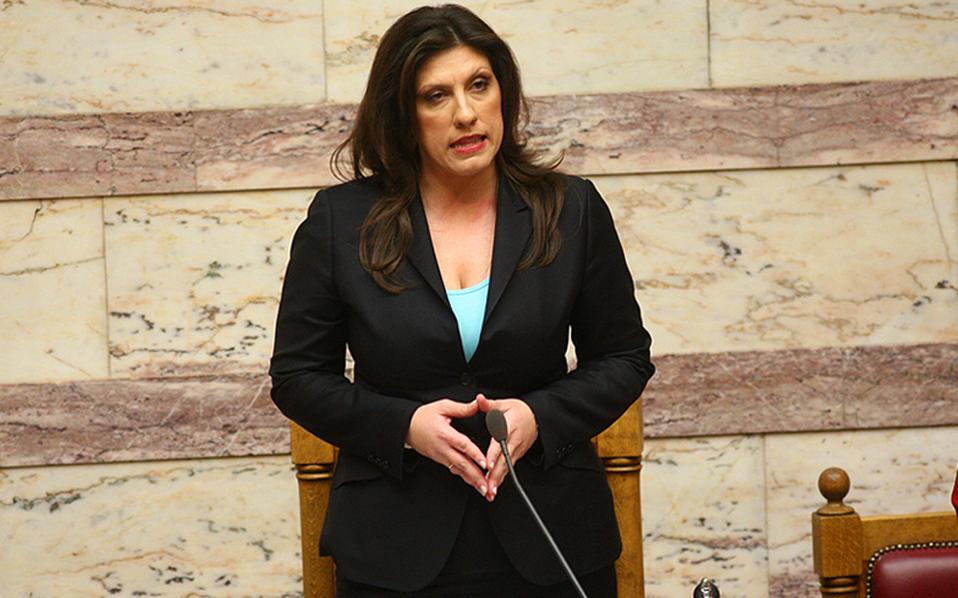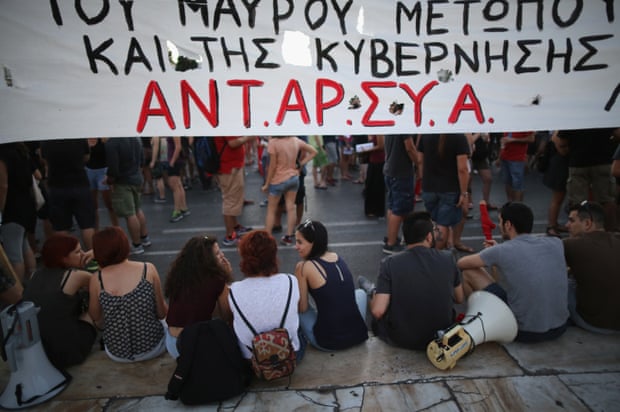LIVE Εκκενώνεται το μοναστήρι του Αγίου Ιωάννη Προδρόμου στον Καρέα - Συνεχής ενημέρωση:http://go.naft.gr/MszUzv #fire #Athens #GreeceHow the latest 'solution' to the debt crisis locks Europe into a grim next chapter
By JAMES K. GALBRAITH
365 Shares
79 Shares
2 Shares
Email
Print
The Greek Parliament has now voted to surrender control of the Greek state to platoons of bureaucrats from Brussels, Frankfurt and Berlin, who will now re-impose the full policy regime against which Greeks rebelled in January 2015 – and which they again rejected, by overwhelming majority, in the referendum of July 5.
The orders from Brussels will impose strict new rules on the Greek people in the supposed interest of paying down Greece's debt. In return, the Europeans and the IMF will put up enough new money so that they themselves can appear to be repaid on schedule–thus increasing Greece's debt–and the European Central Bank will continue to prop up the Greek banking system.
A hitch has already appeared in the plan: the International Monetary Fund, whose approval is required, has pointed out—correctly— that the Greek debt cannot be paid, and so the Fund cannot participate unless the debt is restructured. Now Germany, Greece’s main creditor, faces a new decision: either grant debt relief, or force Greece into formal default, which would cause the ECB to collapse Greece's banks and force the Greeks out of the Euro.
There are many ways to rewrite debt, and let's suppose the Germans find one they can live with. The question arises: What then?
An end to the immediate crisis is likely to have some good near-term effect. The Greek banks will “reopen,” likely on Monday, and the European Central Bank will raise the ceiling on the liquidity assistance on which they rely for survival. The ATMs will be filled, although limits on cash withdrawals and on electronic transfers out of the country will likely remain. There will be some talk of new public investment, funded by the European Union; perhaps some stalled road projects will restart.
With these measures, it is not impossible that the weeks ahead will see a small uptick of economic life, and certainly, any such will make big news. It's also possible that even without good news, Greece may limp along in stagnation, within the Euro.
But if you walk through the requirements of Greece's new program, there is another possibility. That possibility is an economic death spiral – contraction leading to banking failure, banking failure leading to contraction – first in Greece and, later on, elsewhere in Europe.
Here's what that would look like:
Value-added tax rates – your basic regressive sales tax – will jump by ten percentage points or more, to 23 percent, including for hotels and restaurants and including on the Greek islands. This will divert tourists to Turkey and elsewhere, damping Greece's largest industry. Also, it will drive small businesses even further to cash and tax evasion. This means other tax revenues will also fall.
Tax revenues will rise at first, but then they will fall short of targets, both because economic activity falls and evasion rises. As this happens, the new program requires that public spending be cut automatically. Since most public spending goes for pensions and wages, this means that pensions and wages will be cut. Since pensioners and civil servants live on these payments, they will cut their spending – and tax revenues will fall further.
In the labor market, extreme deregulation will proceed. Collective bargaining will be suppressed; wages will therefore fall. As a result, wage labor will go off-the-books, into cash, even more than it already has, and pension contributions will decline again. The resulting tax losses will feed back into pension cuts.
Privatization will work through a required new fund that will, supposedly, hold 50 billion euro in Greek assets to be sold off (notwithstanding the difficulty that, according to the Economy Minister, public assets on that scale do not exist). Anyhow the state electricity company will be sold, and electric rates will rise.
As all this happens, even more people will default on their mortgages. The judicial code will be rewritten to facilitate mass foreclosures, so far held in abeyance. The non-performing-loans of the banking system will then go from disastrous to catastrophic.
Now then, under these conditions, what do you think will happen to the banks?
It is possible that a surge of “confidence” will now bring cash deposits back to the banks, new inter-bank loans from North Europe, new lending to small businesses, new jobs and economic growth. Possible, but not likely.
Much more likely, with every increase of the ceiling on Emergency Liquidity Assistance (ELA), and every relaxation of capital controls, people in Greece will line up to pull cash from the banking system. They will do this because they have to, in order to live. They will do this because cash avoids taxes. They will do it because any fool can see that the banks are doomed. So deposits will go down, the ELA will go up, still more loans will go bad, and the banks will continue as zombies until – at some point – the European Central Bank gives up and closes them down, this time for good. Greek depositors will then lose what little remains.
Meanwhile, let's return to the legal status of the new economic program. It is true that the Greek parliament has approved it – as the Prime Minister said, with a “knife to the neck.” But it is a point of law that a contract signed under duress is not enforceable. This point will be heard soon, and clearly, in Greek politics if not in the courts.
It will resonate, also, through Greek society. The free consent of the governed is a right, which the Greek people have now been denied. They will not take it lightly; one can expect both passive and active resistance. Street conflict—not good for tourism—will become, once again, routine. As this happens, the drachma will become a symbol of national freedom.
Eventually, the Greek majority – the 62 percent who voted “No” on July 5 – will be heard from again. A government elected by that majority will not go back to negotiations. Instead, it will repeal the program, default on the debt, take the consequences and leave the euro.
So within a few months or years, what has just happened will be overturned and repudiated. And if the Greek banks have not failed yet, they will then. At that point, Greece will be poorer than it is, even now—but it will again be independent.
But wait. The death spiral dynamic isn't necessarily limited to Greece. It could start to happen in Spain, Portugal, Ireland, and perhaps Italy – beginning, as it did in Greece, with a fall-off in inter-bank loans from Northern Europe. Bankers, it turns out, are often the first to start a run on other banks.
What the Greek government tried to do, for five months, was to forestall this dynamic, and to bring a glimmer of economic coherence – and the potential for economic survival – to the Eurozone. It tried to get its “partners” to recognize that economic policies that had failed to produce predicted recovery for five years should be reconsidered and changed. For this heresy, Greece was crucified


 ermouμην ξεχάσετε αύριο World Middle Finger DayMinulla on vain neljä (veri)sukulaista.
ermouμην ξεχάσετε αύριο World Middle Finger DayMinulla on vain neljä (veri)sukulaista. mera one friend her what about TheerKielioppia nykynuorille: Substantiivi on se sana, jonka jälkeen voi lisätä "perkele", kuten äijänperkele, autonperkele. Adjektiivi on sana jonka eteen lisätään "paskan", kuten paskantärkee, paskanhailee. Verbi on sana, jonka jälkeen lisätään sanat "ihan sikana". Nyt voi pennunperkeleet päntätä ihan sikana paskanhaileeta kieliopinperkelettä. Yhdyssana on sellanen jonka väliin EI voi laittaa vittu. Niinku
yhdysvittusana. Ei käy. Kuormavittuauto. Ei käy. Aivan vitun ihana. Käy.
mera one friend her what about TheerKielioppia nykynuorille: Substantiivi on se sana, jonka jälkeen voi lisätä "perkele", kuten äijänperkele, autonperkele. Adjektiivi on sana jonka eteen lisätään "paskan", kuten paskantärkee, paskanhailee. Verbi on sana, jonka jälkeen lisätään sanat "ihan sikana". Nyt voi pennunperkeleet päntätä ihan sikana paskanhaileeta kieliopinperkelettä. Yhdyssana on sellanen jonka väliin EI voi laittaa vittu. Niinku
yhdysvittusana. Ei käy. Kuormavittuauto. Ei käy. Aivan vitun ihana. Käy.






















